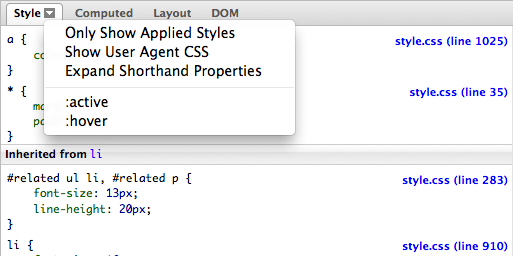Toggle Element State with Google Chrome and Mozilla Firefox
It's much easier to debug CSS than JavaScript since there are many fewer interactions in CSS, and they are much easier emulate. Still, element state debugging isn't simple...until now. Google Chrome's WebInspector and Mozilla Firefox's Firebug have a really sweet feature I just discovered which allows the developer to apply element states for the sake of debugging.
Chrome's WebInspector

The image above displays Chrome's "Toggle Element State" button, allowing developers to toggle CSS states via checkboxes.
Firefox's Firebug

The image displays Firebug's likewise menu, triggered by the down arrow on the CSS tab for an element.
This allows active CSS state bugging vs. simple CSS explorations to be much, much easier. Happy CSS debugging!
![Serving Fonts from CDN]()
For maximum performance, we all know we must put our assets on CDN (another domain). Along with those assets are custom web fonts. Unfortunately custom web fonts via CDN (or any cross-domain font request) don't work in Firefox or Internet Explorer (correctly so, by spec) though...
![7 Essential JavaScript Functions]()
I remember the early days of JavaScript where you needed a simple function for just about everything because the browser vendors implemented features differently, and not just edge features, basic features, like addEventListener and attachEvent. Times have changed but there are still a few functions each developer should...
![Cross Browser CSS Box Shadows]()
Box shadows have been used on the web for quite a while, but they weren't created with CSS -- we needed to utilize some Photoshop game to create them. For someone with no design talent, a.k.a me, the need to use Photoshop sucked. Just because we...
![JavaScript and CSS Spinners with spin.js]()






Great tip, thanks =)
FireBug does this for years. Just click the little arrow next to the style tab. It’s only
:hoverand:active, though.Awesome, just added that as well.
The only thing Chrome cant do with states is when I need to debug an element that matches selector
parentElement:hover element, for exampleChrome applies states only to selected element in inspector and when you selected another element, selected state is applied to new element
Next challenge: Debug pseudo elements with web inspector :p
the Chrome web inspector already supports pseudo elements.
Under the Matched CSS rules is a Psuedo element
I believe the latest version of firebug does similar, but I’m not sure as I haven’t used it in ages
Unfortunately you can not select the pseudo element like any other DOM-Element. Technically this is perfectly valid since pseudo-elements are not part of the DOM but I often miss that feature. Pseudo-elements are harder to debug than necessary.
Good stuff, from what I know this has been around for a while already.
@JAN BECK – not that hard really, you just have to select the main element and scroll down in the inspector panel to see the psuedo elements
it’s also possible to do this with Firefox’ built in developer tools :-)